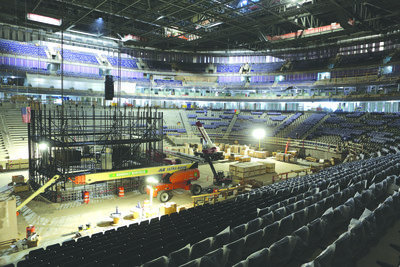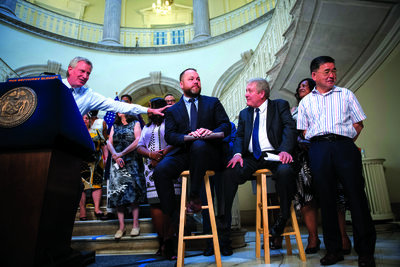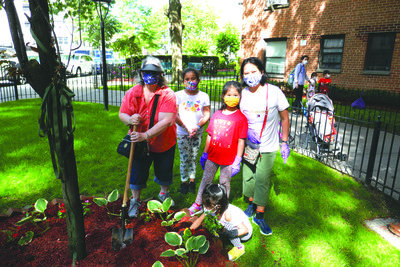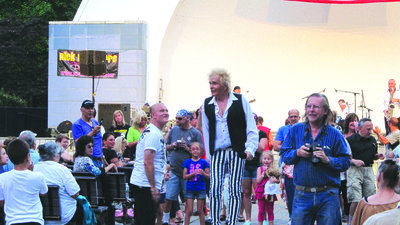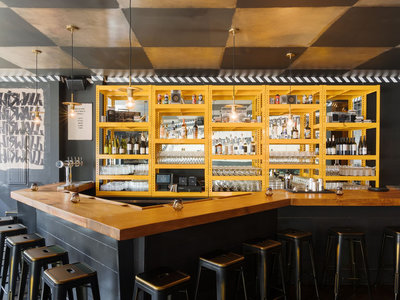An inside look at UBS Arena at Belmont Park
The New York Islanders playoff run ended with a game seven defeat in the NHL semi finals, and since then the sprint to finish the construction of their new home stadium, UBS Arena at Belmont Park, has intensified.
BQE Media recently toured the arena construction site, where as many as 700 construction professionals are at work daily, readying the new arena for the Isles to occupy next season. While there are still many nuts and bolts to tighten before hockey games and concerts can take place, the arena is coming together. “It’s very exciting for those of us working on the project to actually see signage,” said Michael Sciortino, Senior Vice President of Operations and Assistant General Manager of UBS Arena, “It’s a real milestone.”
According to the new venue’s website, “UBS Arena is a part of the $1.5 billion redevelopment of Belmont Park that includes a retail village and hotel. The project is expected to generate approximately $25 billion in economic activity, including 10,000 construction jobs, 3,000 permanent jobs and major infrastructure improvements.”
Although the new sports and concert venue is loaded with modern technology, it will borrow from great New York sites of the past. Architects referenced the original Madison Square Garden, Ebbets Field, the former home of the Brooklyn Dodgers in the Flatbush section of Brooklyn, and even from Grand Central Station in creating UBS Arena’s identity. “It’s an old New York design when talking about the aesthetic of the arena, there’s a Grand Central Station and an early-1900’s New York feel with a lot of the tile and brick work,” said Sciortino.
Sciortino, a Rockland County native and Long Island resident since 2005, spent two years as Vice President of Operations at the Chase Center in San Francisco, home of the Golden State Warriors, handling the day-to-day operations at the facility. For him, hiring construction crews with the right experience has been key. “The architect is Populous, the industry leader for sports and entertainment venues – full stop,” Sciortino said. “The finishes inside and out are stupendous.”
Although the Isles were born into a brand new Coliseum in 1972 and played three seasons at the Barclays Center in Brooklyn starting in 2015, those involved with the UBS Arena project are tasked with the job of creating the world-class stadium Islanders fans have been demanding for decades. The “Isles” closed out their tenancy at the Nassau Veterans Memorial Coliseum, in Uniondale, Long Island with one final win, sending their series with the Tampa Bay Lightning to the limit in front of a passionate crowd that just didn’t want to leave.
In the design process, the Isles made sure to equip their new home with a number of amenities that were weak points at their previous venues.
First, the Isles made sure to add the luxury spaces like bars and suites that the Nassau Coliseum never had enough of. At UBS Arena, there will be eight bars with views of the ice and several “VIP suites and clubs inspired by New York.” According to a press release dated May 8, UBS Arena has already sold out of 80% of premium seating.
The Isles faced critics league wide when they moved to the Barclays Center, a venue that was built for basketball and has many seats where views of the hockey nets are obscured to the crowd. The new venue was designed to replicate and improve upon the sight lines at the Nassau Coliseum, known for its intimate vibe and robust views.
Another area where the Isles will have an advantage league-wide is in the bathroom. While fans found crowded restrooms at the Nassau Coliseum, Sciortino says UBS Arena will have the best restroom-to-fan ratio locally and in the NHL overall. There are 68 guest-facing restrooms, 12 of which are “family style.”
Still, Sciortino says the Isles won’t be able to host games in the building until November, forcing the team to start the season on the road. Recently, plans were announced to hold the Isles preseason games in Bridgeport, CT, where the Isles have their farm team.
With much work left to do, Sciortino and his staff are poised for challenges that may emerge in the completion process.
“We prepare for everything we know about. I’m always most nervous about the thing that we don’t know about yet,” Sciortino says. “There’s some gremlin in this building that no one knows about yet that is going to create a problem for us later, we just need to be prepared.”



